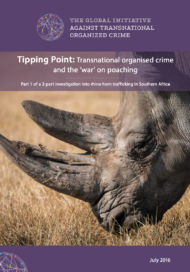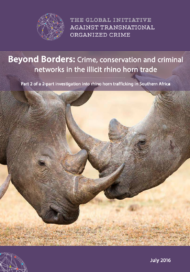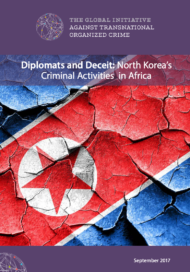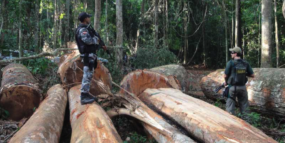Posted on 11 Jul 2016
Six thousand rhinos have fallen to poachers’ bullets in Africa over the past decade and only about 25,000 remain – a fraction of the tens of thousands that roamed parts of the continent fifty years ago. Dozens more have been shot in so-called “pseudo-hunts”. Across Europe, castles and museums have been raided by criminal gangs in search of rhino horn trophies. And in the United States, businessmen, antique dealers – even a former rodeo star and a university professor – have been implicated in the illicit trade. Driven by seemingly insatiable demand in Southeast Asia and China, rhino horn has become a black market commodity rivalling gold and platinum in value.
Borders, bureaucracy and a tangle of vastly different laws and legal jurisdictions are a boon to virulent and versatile transnational criminal networks and a bane to the law enforcement agencies rallied against them. Again and again efforts to target syndicates are hamstrung by corruption, governments that are unwilling or incapable of acting, a lack of information-sharing and approaches to tackling crime that wrongly emphasise arrests and seizures over targeted investigations and convictions as a barometer of success.
Drawing on extensive interviews with officials in government, conservation and law enforcement agencies in Southern Africa, Asia and Europe, this two-part report by the Global Initiative Against Transnational Organised Crime examines law enforcement responses to international rhino horn trafficking syndicates and investigates legal loopholes and institutional lapses that allow the illicit trade to fester.
Written by Julian Rademeyer, Global Initiative Senior Researcher and author of the best-selling book Killing For Profit – Exposing the illegal rhino horn trade, the reports shed new light on a shadowy underworld.
The reports expose:
- The links between hunters from eastern Europe and sham rhino hunts used as a means of obtaining rhino horn for Asian criminal networks;
- The involvement of a convicted Vietnamese rhino horn smuggler and “diamond magnate” in a South African game farm where rhinos and tigers are hunted and bred for export to Vietnam;
- The involvement of Zimbabwe’s feared Central Intelligence Organisation in rhino poaching;
- Institutional lapses and corruption in Mozambique that have allowed Chinese rhino horn smugglers to escape the net;
- Dodgy diplomats who abuse their diplomatic privilege to smuggle rhino horn;
- The resurgent role of North Korea’s diplomatic missions in the illicit rhino horn trade.
The reports highlight the need for a radical rethink of global efforts to disrupt and counter sophisticated criminal networks involved in poaching and wildlife trafficking.





